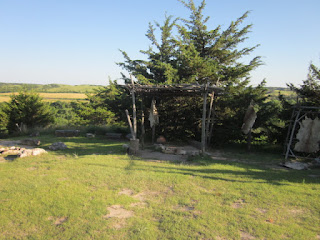From there we drove out to the northwest edge of town to visit the Golden Spike Tower overlooking Union Pacific's Bailey Train Yard. At two miles wide and eight miles long, Bailey is the largest train yard in the world. The Golden Spike Tower has an open-air observation deck on the seventh floor and a glassed-in, 360-degree viewing area on the eighth floor overlooking the whole operation. The whole thing is very impressive.
While we were looking around the eighth-floor viewing area, I came across a brochure for area attractions. My wife spotted Dancing Leaf Cultural Learning Center in Wellfleet. After looking up the location of Wellfleet -- about 25 miles south of North Platte -- we called to see what their hours were. The woman on the phone was happy to give us any information we needed and effectively told us to show up and we would get the tour whenever we arrived. We were even offered to join an earlier group for some traditional native buffalo stew, but we were still full from our late lunch.
We arrived at Dancing Leaf and were greeted by Les and Jan Hosick. After a quick round of introductions and the obligatory explanation of why were hanging out in North Platte, Les took us to a small building across the driveway from their home. I'll admit, as we walked into the the single-room box with a single row of metal folding chairs and shelves covered with bones and artifacts I wondered if this might turn out to be disappointing. After only a few minutes of listening to Les talk about prehistoric Nebraska I was completely sucked in. He told us about prehistoric geography and why so many artifacts can be found in Nebraska using charts, maps, fossils, bones, and plaster casts. He went on to discuss Native American culture and history with an impressive array of artifacts. After almost an hour of fascinating show& tell and Q&A, we took a short walk out of the classroom to the earth lodge Les has built as a recreation of an actual Native American lodge.
 Outside the lodge are primitive racks for drying and tanning, an arbor of limbs and twigs to form a shaded work area, campfire, and a whole new assortment of artifacts to recreate the entire native family home. Inside the lodge was amazing! While Les admitted to using modern hand-tools -- he spoke quite a bit about the fragility of tools made from stone, sticks, and bones and the need for native peoples to be skilled in tool making -- the lodge is an authentic replica. The temperature inside was probably 15 degrees (fahrenheit) cooler than outside. We sat inside around the fire ring and Les told us about family life in and around the lodge and about construction of the lodge itself.
Outside the lodge are primitive racks for drying and tanning, an arbor of limbs and twigs to form a shaded work area, campfire, and a whole new assortment of artifacts to recreate the entire native family home. Inside the lodge was amazing! While Les admitted to using modern hand-tools -- he spoke quite a bit about the fragility of tools made from stone, sticks, and bones and the need for native peoples to be skilled in tool making -- the lodge is an authentic replica. The temperature inside was probably 15 degrees (fahrenheit) cooler than outside. We sat inside around the fire ring and Les told us about family life in and around the lodge and about construction of the lodge itself.By the time we made our way back to the gift shop Les had spent close to two hours with my wife and I and every minute was riveting. I picked up an arrowhead necklace for a souvenir and also picked up a book, How Can One Sell The Air?
"Wild Bill" Cody, the world's largest train yard, and the coolest history field-trip ever. We didn't even make it to Buffalo Bill's Ranch. North Platte, Nebraska is a pretty cool place!




